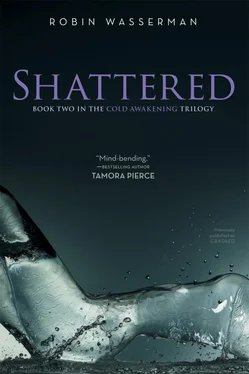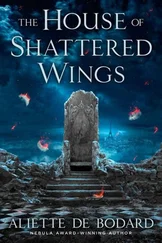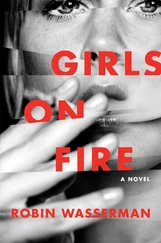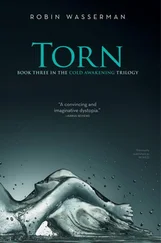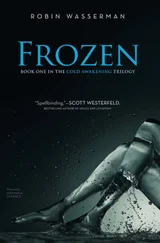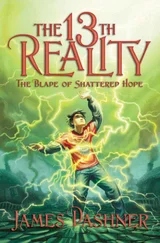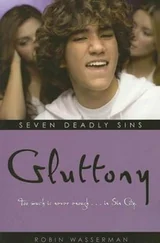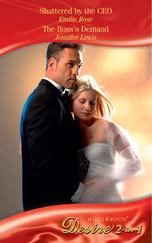“But I thought you said you spent a few weeks in the hospital before the download and that you could pretty much do whatever you wanted.” I knew that was when she, Jude, and Riley had gotten close. The way Ani talked about them, I figured they had sort of adopted her, for whatever reason taken her under their protection. A hospital where a bunch of city kids could do whatever they wanted—even city kids rife with missing limbs and congenital diseases—could be a dangerous place.
“Yeah, I did. And I asked around. The kids I came in with weren’t there anymore.”
“BioMax sent them back?” I asked, surprised.
Ani shook her head.
“Then what?”
She rolled her eyes, her mouth set in a grim line. The moving sidewalk had carried us through a shimmering silver tunnel and dumped us in some kind of anteroom. Huge golden doors—ridiculously new and shiny compared to the rest of the dump—marked this as the entry to the inner sanctum. It was unsettling the way Ani had guided us here, so smooth and sure, as if she belonged. “Jude and I weren’t the first downloads,” she said, patience and pedantry mixing in her tone like she was a teacher dealing with a particularly remedial student. “Just the first successes.”
“Oh.”
Volunteers for the advancement of science, BioMax had called them. Heroes. Submitting themselves to an experiment for the benefit of the greater good.
“I’m sorry,” I said lamely.
“It’s not like they were my friends. Just people I knew.” Ani tugged her camo hood tighter over her head, dropping her face into shadow. “Come on. Let’s go in.”
“It took a kiss from a princess to wake me up.”
By the time we slipped into the auditorium, Savona and Auden had already taken the stage. Several hundred people crowded into the wide, windowless space, crushed against one another in their desperation to get closer to their heroes. Auden’s face beamed down at us from giant screens lining the walls. His face, ten feet high, every scar magnified. It was easy, it was nothing, to have a scar brushed away, but Auden had left his intact, thick, pale worms of white crawling across his cracked lips and crooked nose. He looked different than before—not just paler and thinner but almost like a stranger, his nose jutting at a sharper angle, his chin flatter, and I remembered the patchwork of bandages across his face the last time I’d seen him in person and wondered how much of him had been rewired and rebuilt.
His eyes sparkled, pools of black at their center flooding out the green, as if he stared out at a darkened room. Or as if he was zoned. It felt like he was watching me.
But when I turned away from the screens, forced myself to look at the real Auden, a tiny figure on the distant stage, it was obvious he couldn’t have seen me in the crowd. From where I stood, I could barely pick out the familiar features of his face or the cane he leaned on for balance—there was no way he could look into the sea of bobbing heads and pick out my hood-rimmed face in the crowd.
“They don’t understand,” he was saying, alone under a spotlight. Savona stood off to the side, hands folded, nodding with approval. They wore identical iridescent suits that rippled in shimmering rainbow, like light on an oil slick. “Those who stay comfortably at home, watching us on the vids. They think it’s all the same. But is it the same?”
“No!” the crowd shouted, barely waiting for the question. They were well-rehearsed.
“No,” Auden said again, as quiet and calm as the crowd was manic. “We meet here, we come together in person, body to body, to affirm our own humanity. To remind ourselves that being human is about more than the ability to watch a vid, to make a speech, to communicate, to think . Are we just minds, disconnected islands of cognition, connected only by an electronic web?”
“No!” came the enthusiastic response.
“Mind is inseparable from body,” Auden said. “When one hurts…” He paused, and the giant screens overhead showed him brushing two fingers against a jagged scar on his neck. “The other screams in pain.” He shook his head. “We don’t live in our minds. We live in our bodies. There is no mind without body, no body without mind. Life is born in their merger. A mind shoved into a machine is—”
“Still a machine!” the crowd screamed. “Still a machine!” I glanced at Ani, who was dutifully mouthing the words. But I couldn’t fit my lips around them.
“Dead,” Auden said. “Dead thoughts in a dead body, imitating life. But we know life,” he said. “Life infuses the heart, the liver, the arms and…” He paused again, looking down at the cane. “Legs.” Auden limped forward to the edge of the stage, peering intently out at the audience. The room fell silent. “The skinners wear a mask,” he said, his voice so low it was almost a whisper. “They hide among us. They clothe themselves as human—clothe themselves in human skin, identities stripped from the dead. They prey on the confusion of the grieving.” He clapped a fist over his chest in an unmistakable gesture of self-flagellation. “They prey on the sympathies of the weak.”
“You’re not weak!” someone behind us shouted.
“This is new,” Ani whispered to me. “Usually it’s just the same old stuff—I’ve never heard this before.”
Auden shook his head. “But I was weak, friend.”
Friend? It wasn’t just what he was saying, it was the words themselves—it didn’t even sound like Auden, not the one I’d known. What did they do to you? I thought.
What did I do to you?
“I believed that because it spoke like something human, because it appeared to act like something human, it was something human. And why not? In that life, before, I lived a life of the mind. I worshipped at the altar of rational thought. I told myself I believed only in what I could see, what I could touch—all the while ignoring the reality of what my senses were telling me. What did I really believe in? An imaginary entity, the mind , the self, as if that was something that could exist outside of the brain . As if it was possible to distill an identity from electrical impulses, suck them out of a skull, dump them into a computer. I told myself I was a rationalist, that the Faithers believed in a fairy tale.”
There was a bit of uncomfortable mumbling in the crowd, as if they weren’t sure whether they were supposed to cheer or boo.
“But I was the one trapped in the fairy tale,” Auden continued. “I was under a spell. And just like in a fairy tale, it took a kiss from a princess to wake me up.”
I couldn’t shake the feeling that his eyes were resting on me.
“The skinner breathed its dead breath into my body. It gave me life, though it had none of its own to give. And despite everything else, I’m grateful to it for that.”
Now the crowd didn’t hesitate. The booing and cursing drowned him out for several moments. But then Auden raised his hand, and they fell silent.
“I am grateful,” he said. “Because when I opened my eyes, when I felt the pain of being trapped forever in this broken body, I knew the truth. That humanity doesn’t live in the mind. That I am my mind and my body. And no matter what the skinner says, no matter how good a show it puts on, this is the one truth the skinner cannot hide. They can lie—their bodies can’t.”
Savona joined Auden at center stage, basking in the applause. It was easier when he began to speak. I could ignore his words, the same old Faither bullshit about how only God could create life, about how skinners were abominations, how creating more of them would drive society to its knees, and on and on—it didn’t penetrate. I’d heard it all before, empty logic resting on the existence of some ludicrous invisible eye in the sky. It was easier because it wasn’t Auden.
Читать дальше
